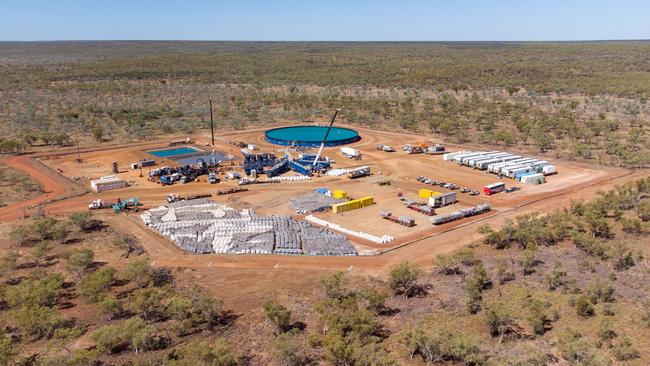APA Group rejects calls to abandon projects in Beetaloo Basin
The company has doubled down on the importance of gas in the energy transition, rejecting calls to abandon contentious fracking projects in the Beetaloo Basin.

Gas pipelines company APA Group has doubled down on the importance of natural gas in Australia’s energy transition, rejecting calls for it to abandon plans to transport future supplies from contentious fracking projects in the Beetaloo Basin.
Questions about the company’s role in supporting developments in the gas-rich region of the Northern Territory dominated the company’s annual meeting in Sydney on Thursday, following a push from activist investor Market Forces for the company to report on how its infrastructure investments aligned with its climate commitments.
Addressing securityholders, APA chairman Michael Fraser said it was a premature debate, given the company had so far only committed to one small infrastructure project in the Beetaloo Basin - a 35km pipeline connecting Tamboran Resources’ pilot wells with APA’s main pipeline running up to Darwin.
“There is a real lack of clarity about what future infrastructure there may be in the Beetaloo – it is very early on and there is a lot of work that needs to be done by the upstream players,” he said.
“What we also know about any upstream project, and any pipeline project for that matter, is that it’s going to be subject to significant, rigorous, scientific environmental assessment and approval processes.

“We respect those processes, and I think others should also respect those processes. We also know that from our perspective, any new pipelines that we build will be to the highest engineering standards, engineering out, as far as possible, the emissions associated with it.”
Market Forces was seeking amendments to APA’s constitution that would have given individual securityholders the right to voice their opinions on board strategy via resolutions at annual meetings.
While the proposal secured less than 7 per cent of proxy votes cast before Thursday’s meeting, more than 12 per cent of votes were cast in favour of a third resolution calling for APA Group to prepare a report analysing how scope 1, 2 and 3 emissions from its planned capital expenditure program – including potential Beetaloo basin pipelines – were compatible with its emissions reduction targets.
Mr Fraser told shareholders the company had recently committed to enhance its disclosures in future climate reports, including providing emissions estimates for individual projects – including in the Beetaloo Basin – once they had reached a final investment decision.
Empire Energy and Tamboran Resources have been exploring the Beetaloo Basin since the Northern Territory government approved a full-scale fracking industry last year.
Mr Fraser said there was “a whole body of evidence that with the proper regulation safeguards in place, fracking is completely safe”.
“In Australia fracking has been going on for 60-odd years now, and projects in the Northern Territory are not going to go ahead unless they get approved following rigorous, scientific and environmental approval processes,” he said.
“The other thing that I would say is it’s very clear that there are more gas supplies needed for Australia to make the transition. If the gas supplies aren’t there, really the consequence of that is the coal-fired power stations continue to run.
“It’s very clear – the Future Gas Strategy says it, AEMO says it, the ACCC says it – we need more gas supplies to help the economy transition.”
Leading scientists and activists have been pushing APA Group’s largest shareholders to use their holdings to push the company to stop plans to develop gas pipelines in the Beetaloo Basin, where there are concerns over the climate, groundwater and health impacts of fracking in the region.
Last week, the company’s security price slumped to a 10-year low after it was revealed its largest shareholder, UniSuper, was looking to offload $500m of shares via a block trade.
Questioned about the company’s underperforming investor returns over recent years, Mr Fraser said a number of factors were at play, including the higher interest rate environment and the regulatory uncertainty facing the wider gas industry.
“There is no question about the correlation between interest rates and APA stock price. That clearly has had an influence,” he said.
“The rate of growth of our distributions has pared back as we as a board look at the opportunities that we have ahead of us, and trying to balance continuing that growth for our security holders ... but at the same time making sure that we’ve got the balance sheet in good shape for the significant growth opportunities that we have ahead of us.
“We have invested heavily in the business over the last few years, in systems, processes, people, the whole capability set of the organisation. In part that’s because we had underinvested for a number of years, but it’s also because we’re going into new areas of business around electricity transmission, as one very obvious example, versus our traditional gas transmission business.”
On the regulatory front, APA secured a reprieve earlier this month when the Australian Energy Regulator handed down a preliminary decision to maintain current pricing rules for the company’s South West Queensland Pipeline (SWQP) – a key supply link connecting Queensland with the southern states.
APA Group escaped a second strike against its remuneration report on Thursday, with more than 94 of proxy votes endorsing the report, following a first strike at last year’s meeting.





To join the conversation, please log in. Don't have an account? Register
Join the conversation, you are commenting as Logout